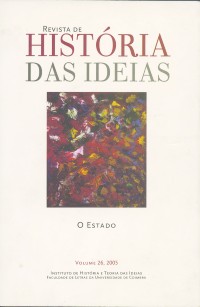Please use this identifier to cite or link to this item:
https://hdl.handle.net/10316.2/41676| DC Field | Value | Language |
|---|---|---|
| dc.contributor.author | Pires, Edmundo Balsemão | - |
| dc.date.accessioned | 2017-05-08T10:27:29Z | |
| dc.date.accessioned | 2020-09-30T11:26:40Z | - |
| dc.date.available | 2017-05-08T10:27:29Z | |
| dc.date.available | 2020-09-30T11:26:40Z | - |
| dc.date.issued | 2005 | - |
| dc.identifier.issn | 0870-0958 | - |
| dc.identifier.issn | 2183-8925 (digital) | - |
| dc.identifier.uri | https://hdl.handle.net/10316.2/41676 | - |
| dc.description.abstract | O presente ensaio pretende mostrar de que modo alguns aspectos da Filosofia Política de Hegel podem ser usados tanto na reconstrução conceptual como na justificação ideológica do poder político do nacional- -socialismo. O autor mostra como o conhecido esquema histórico e teórico da "dialéctica do senhor e do servo" pode servir para interpretar determinadas sobrevivências históricas na concepção do poder nazi e do poder totalitário. No sentido de desenvolver esta ideia refere-se o autor às concepções de A. Kojève e de G. Bataille. Mas o ensaio também expõe conexões mais directas entre o neo-hegelianismo político e o nazismo, mostrando os traços essenciais das teorias da escola jurídica de Gottingen dos anos 1920 e 1930 (J. Binder, G. Dulckeit e K. Larenz) e a sua recuperação nas ideias sobre o direito e o poder político de C. Schmitt. | por |
| dc.description.abstract | This essay tries to explain the influence of some aspects of hegelian political philosophy both in conceptual reconstruction as also in ideological justification of national-socialism. The author shows how the well known historical and theoretical device of the "dialectic of lord and servant" can be used as an interpretation model for the survival of some archaic and feudal positions in the nazi and totalitarian concepts of power. In order to develop this idea the author refers to A. Kojève's and G. Bataille's conceptions. But the essay also explains more direct connections between the Gottingen law school of the 1920's and 1930's (J. Binder, G. Dulckeit and K. Larenz) and C. Schmitt own conception of law and political power. | eng |
| dc.language.iso | por | - |
| dc.publisher | Imprensa da Universidade de Coimbra | - |
| dc.rights | open access | - |
| dc.title | "Estado do Führer": Hegelianismo para tempos de sangue e aço | por |
| dc.title.alternative | "The State of the Führer": Hegelianism for times of blood and steel | por |
| dc.type | article | - |
| uc.publication.collection | Revista de História das Ideias vol. 26 | - |
| uc.publication.firstPage | 199 | - |
| uc.publication.lastPage | 258 | - |
| uc.publication.location | Coimbra | - |
| uc.publication.journalTitle | Revista de História das Ideias | - |
| uc.publication.volume | 26 | por |
| dc.identifier.doi | 10.14195/2183-8925_26_8 | - |
| uc.publication.orderno | 9 | - |
| uc.publication.area | Artes e Humanidades | - |
| uc.publication.manifest | https://dl.uc.pt/json/iiif/10316.2/41676/248489/manifest?manifest=/json/iiif/10316.2/41676/248489/manifest | - |
| uc.publication.thumbnail | https://dl.uc.pt/retrieve/11863277 | - |
| item.grantfulltext | open | - |
| item.fulltext | With Fulltext | - |
| Appears in Collections: | Revista de História das Ideias | |
Files in This Item:
| File | Description | Size | Format | |
|---|---|---|---|---|
| estado_do_fuhrer_hegelianismo.pdf | 9.12 MB | Adobe PDF |  |
Items in DSpace are protected by copyright, with all rights reserved, unless otherwise indicated.
